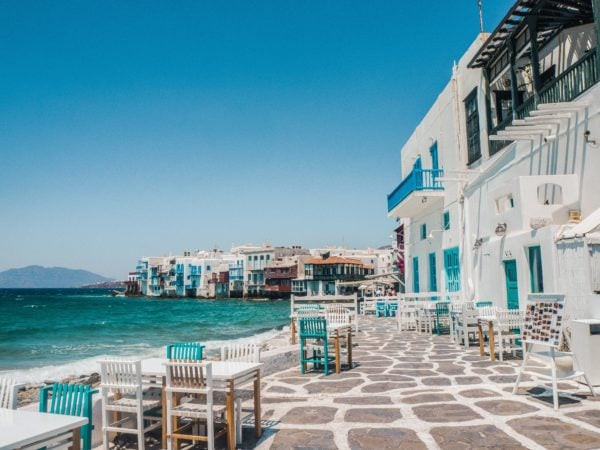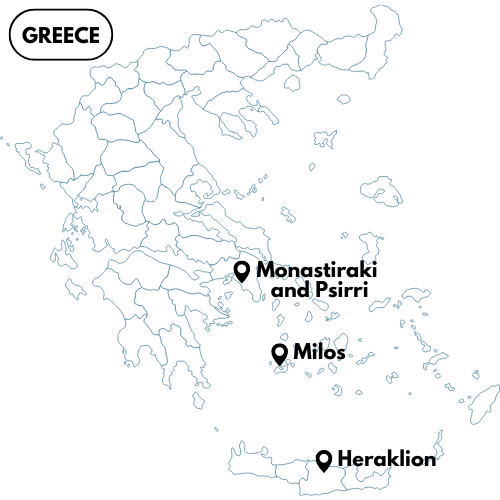Planning a trip to Greece in 2024 and wondering about safety? This comprehensive guide, brought to you by SIXT.VN, answers all your concerns, ensuring a secure and enjoyable travel experience. Discover up-to-date safety information, travel tips, and how SIXT.VN can make your Greek adventure seamless and stress-free. Get ready to explore the beauty of Greece with confidence with travel advice and travel safety.
1. Understanding Travel Safety in Greece 2024
Is Greece a Safe Country to Visit in 2024?
Yes, Greece remains a very safe destination for tourists in 2024. According to the U.S. State Department and numerous travel advisories, Greece generally experiences low levels of crime, particularly violent crime. However, like any popular tourist destination, petty theft can occur, especially in crowded areas.
Greece consistently ranks high on safety indices. According to the Global Peace Index, Greece is considered safer than many other European countries. The European Commission also highlights Greece’s commitment to maintaining a safe environment for tourists through various security measures and initiatives. This means that travelers can generally feel secure while exploring the ancient ruins, beautiful islands, and vibrant cities of Greece. As long as you take standard precautions like safeguarding your belongings, being aware of your surroundings, and avoiding poorly lit areas at night, your trip to Greece should be trouble-free.
 Overlooking Greece Waters
Overlooking Greece Waters
What are the Current Travel Advisories for Greece?
Travel advisories for Greece are typically low, but it’s always wise to stay informed. Check the U.S. State Department’s website for the most up-to-date information. These advisories provide crucial details about potential risks and safety recommendations.
The U.S. Embassy and Consulate in Greece are also valuable resources. They offer assistance and guidance to American citizens in Greece. Signing up for the Smart Traveler Enrollment Program (STEP) ensures you receive alerts about any dangers during your trip and allows the embassy to contact you in case of an emergency. This proactive approach to safety can provide peace of mind throughout your travels.
Are There Any Specific Safety Concerns in Athens?
Athens is generally safe, but tourists should be aware of petty crime, especially in crowded tourist areas like Monastiraki and Plaka. According to the Athens Attica Hotel Association, hotels in these areas often provide safety tips to their guests to minimize risks.
Be cautious of pickpockets and bag snatchers, particularly on public transportation and in busy markets. Keep your valuables secure and avoid displaying expensive jewelry or electronics. Stay vigilant, especially at night, and avoid walking alone in poorly lit or deserted areas. It’s also advisable to be wary of scams targeting tourists, such as inflated taxi fares or offers of assistance that lead to theft. By staying alert and taking basic precautions, you can enjoy all that Athens has to offer without compromising your safety.
2. Navigating Travel Restrictions and Requirements
What are the COVID-19 Related Travel Restrictions for Greece in 2024?
As of 2024, Greece has lifted most COVID-19 related travel restrictions. Travelers are generally not required to show proof of vaccination or negative COVID-19 tests for entry. However, it’s crucial to verify the latest requirements before your trip.
Always refer to the U.S. Embassy in Greece and the Greek Ministry of Tourism for the most current guidelines. While masks are not generally required, they may still be mandatory in medical facilities and nursing homes. Staying informed about these regulations ensures a smooth and compliant travel experience.
Do I Need a Visa to Visit Greece?
For short tourist visits, U.S. citizens typically do not need a visa to enter Greece. You can stay for up to 90 days within a 180-day period without a visa. However, ensure your passport is valid for at least six months beyond your intended stay.
If you plan to travel for reasons other than tourism, such as work or study, you will need to apply for the appropriate visa. The U.S. Embassy in Greece provides detailed information on visa requirements and application procedures. Always check the specific requirements based on your travel purpose to avoid any entry issues.
Is Travel Insurance Necessary for a Trip to Greece?
While not mandatory, travel insurance is highly recommended for your trip to Greece. It provides coverage for unexpected events such as medical emergencies, trip cancellations, and lost or stolen belongings.
Travel insurance can protect you from significant financial losses if you encounter unforeseen issues during your trip. According to a study by Allianz Global Assistance, medical emergencies are a primary reason for travel insurance claims. Policies often include coverage for COVID-19 related incidents, providing added security in uncertain times. With travel insurance, you can enjoy your Greek vacation with greater peace of mind, knowing you’re protected against unexpected events.
 Shipwreck Beach in Greece
Shipwreck Beach in Greece
3. Practical Safety Tips for Traveling in Greece
How Can I Stay Safe While Traveling Between Greek Islands?
Traveling between Greek islands is a popular activity, but it’s essential to prioritize safety. Ferries are the most common mode of transport, and it’s crucial to book tickets from reputable companies. Check ferry schedules and weather conditions before your trip, as delays and cancellations can occur due to strong winds or rough seas.
Keep a close watch on your belongings while on board, and be aware of your surroundings, especially during boarding and disembarking. The Hellenic Coast Guard provides safety guidelines for ferry travel. Additionally, consider purchasing travel insurance that covers inter-island travel to protect against potential disruptions or emergencies.
What Should I Know About Transportation Safety in Greece?
Greece has a well-developed transportation system, but safety varies depending on the mode of transport. Public transportation in Athens and other major cities is generally safe, but be aware of pickpockets, especially during peak hours.
Taxis are readily available, but ensure the driver uses the meter to avoid inflated fares. Ride-sharing services like Uber are also available in some areas. When driving, be aware that Greek roads can be narrow and winding, particularly in rural areas and on the islands. Drive defensively and adhere to traffic laws. The European Road Safety Observatory provides valuable data on road safety in Greece.
Are There Any Specific Scams I Should Be Aware Of?
Like any popular tourist destination, Greece has its share of scams. Be wary of overly friendly strangers offering assistance, as they may be trying to distract you while an accomplice steals your belongings. Avoid unlicensed taxis or tour operators, as they may overcharge or provide substandard services.
Be cautious of street vendors selling counterfeit goods, and always negotiate prices before agreeing to a purchase. The Greek National Tourism Organization advises tourists to use official and licensed services to avoid scams. If you suspect you’ve been scammed, report it to the local police and the tourist police.
 Outdoor seating in Greece
Outdoor seating in Greece
4. Staying Healthy During Your Trip
What Health Precautions Should I Take Before Traveling to Greece?
Before traveling to Greece, consult your doctor about any necessary vaccinations or health precautions. Ensure your routine vaccinations are up to date, and consider getting vaccinated against hepatitis A and typhoid, especially if you plan to eat at smaller, local establishments.
Pack a basic first-aid kit with essentials like pain relievers, antiseptic wipes, bandages, and any prescription medications you take regularly. The Centers for Disease Control and Prevention (CDC) provides comprehensive health information for travelers to Greece. It’s also a good idea to learn about the location of hospitals and pharmacies in the areas you plan to visit.
How Can I Avoid Food and Waterborne Illnesses?
While Greece has high standards of food safety, it’s still wise to take precautions to avoid food and waterborne illnesses. Drink bottled water instead of tap water, especially in rural areas. Avoid ice in your drinks, as it may be made from tap water.
Eat at reputable restaurants and avoid street food from vendors with questionable hygiene practices. Ensure that meat and seafood are thoroughly cooked and served hot. Wash your hands frequently with soap and water, especially before meals. The World Health Organization (WHO) offers guidelines on food safety for travelers.
What Should I Do in Case of a Medical Emergency?
In case of a medical emergency in Greece, dial 112 for the European emergency number, which can connect you to the police, ambulance, or fire department. Greece has a network of public and private hospitals and clinics.
If you have travel insurance, contact your insurance provider as soon as possible to understand your coverage and receive assistance with medical expenses. The U.S. Embassy in Greece can provide a list of English-speaking doctors and hospitals. Knowing what to do in a medical emergency can provide peace of mind and ensure you receive prompt and appropriate care.
5. Exploring Greece Responsibly
How Can I Travel Sustainably in Greece?
Sustainable travel is increasingly important, and there are many ways to minimize your environmental impact while in Greece. Choose eco-friendly accommodations, such as hotels that have implemented energy-saving measures and waste reduction programs.
Support local businesses and restaurants that use locally sourced ingredients. Respect the environment by avoiding littering and staying on marked trails when hiking. The Sustainable Travel International provides resources and tips for responsible travel.
What Cultural Norms Should I Be Aware Of?
Respecting local customs and traditions is essential for a positive travel experience. Greeks are generally warm and hospitable, but it’s important to be mindful of their cultural norms. Dress modestly when visiting churches and religious sites.
Avoid loud or disruptive behavior in public places. Learn a few basic Greek phrases, such as “hello” (yiasou) and “thank you” (efharisto), to show your respect for the local language. The Greek National Tourism Organization offers insights into Greek culture and etiquette.
How Can I Support the Local Economy?
Supporting the local economy is a great way to give back to the communities you visit. Shop at local markets and artisan shops, and purchase handmade souvenirs. Eat at family-owned restaurants and tavernas, and try traditional Greek dishes.
Use local transportation services, such as buses and taxis, instead of relying solely on international companies. Consider staying at locally owned guesthouses or boutique hotels. By making conscious choices to support local businesses, you can contribute to the economic well-being of the communities you visit.
 Outdoor seating of a restaurant in Greece
Outdoor seating of a restaurant in Greece
6. Essential Services Offered by SIXT.VN for Your Greek Adventure
How Can SIXT.VN Simplify My Airport Transfer in Greece?
Arriving in a new country can be stressful, especially after a long flight. SIXT.VN offers reliable and comfortable airport transfer services, ensuring a smooth and hassle-free journey from the airport to your hotel.
Our professional drivers will meet you at the arrival gate, assist with your luggage, and transport you safely and efficiently to your destination. With SIXT.VN, you can avoid the long taxi queues and the uncertainty of public transportation. Enjoy a comfortable and stress-free start to your Greek adventure.
What Hotel Booking Options Does SIXT.VN Provide in Greece?
Finding the perfect accommodation is crucial for a memorable trip. SIXT.VN offers a wide range of hotel booking options to suit every budget and preference. Whether you’re looking for a luxurious beachfront resort or a cozy boutique hotel in the heart of Athens, we have you covered.
Our user-friendly platform allows you to easily search and compare hotels, read reviews from other travelers, and book your accommodation with confidence. With SIXT.VN, you can find the perfect home base for your Greek adventure.
How Can SIXT.VN Help Me Book Tours and Activities in Greece?
Greece is a land of rich history, stunning landscapes, and vibrant culture. SIXT.VN offers a variety of tours and activities to help you explore the best of what Greece has to offer. From guided tours of ancient ruins to boat trips to hidden beaches, we have something for everyone.
Our expert guides will provide you with insider knowledge and ensure you have an unforgettable experience. With SIXT.VN, you can easily book tours and activities that fit your interests and schedule, making the most of your time in Greece.
7. Unveiling Hidden Gems in Greece
What are Some Underrated Destinations to Visit?
While destinations like Santorini and Mykonos are famous for their beauty, Greece has many lesser-known gems waiting to be discovered. Consider visiting the island of Milos, known for its stunning beaches and unique volcanic landscapes.
Explore the charming town of Nafplio, with its Venetian architecture and rich history. Discover the monasteries of Meteora, perched atop towering rock formations. These underrated destinations offer a more authentic and off-the-beaten-path experience.
Where Can I Find Authentic Greek Cuisine?
To experience authentic Greek cuisine, venture beyond the touristy restaurants and seek out local tavernas and family-owned establishments. Visit the Monastiraki and Psirri neighborhoods in Athens for a taste of traditional Greek dishes.
Explore the local markets and purchase fresh ingredients to cook your own meals. Don’t be afraid to ask locals for recommendations on the best places to eat. Authentic Greek cuisine is all about fresh, locally sourced ingredients and time-honored recipes.
What Unique Cultural Experiences Can I Enjoy?
Greece offers a wealth of unique cultural experiences. Attend a traditional Greek festival, with music, dancing, and local delicacies. Visit a local winery and sample Greek wines. Take a cooking class and learn to prepare traditional Greek dishes.
Explore the ancient ruins and learn about the rich history and mythology of Greece. Visit a local artisan shop and learn about traditional crafts. These unique cultural experiences will give you a deeper appreciation for the beauty and heritage of Greece.
 Three hidden gem locations pinned on a map of Greece
Three hidden gem locations pinned on a map of Greece
8. Family-Friendly Travel in Greece
Is Greece a Good Destination for Families?
Yes, Greece is an excellent destination for families, offering a wide range of activities and attractions that appeal to children of all ages. The beaches are perfect for swimming and sunbathing, and many resorts offer kids’ clubs and family-friendly amenities.
Ancient ruins like the Acropolis in Athens and the Palace of Knossos in Crete are educational and engaging for children. Consider visiting the island of Rhodes, known for its family-friendly atmosphere and beautiful beaches. Greece offers a perfect blend of relaxation, adventure, and culture for families.
What Activities Can Families Enjoy Together?
Families can enjoy a variety of activities together in Greece. Take a boat trip to explore hidden coves and beaches. Visit a water park for a day of fun and excitement. Go hiking in the mountains and enjoy the stunning scenery.
Explore the local markets and sample Greek delicacies. Attend a traditional Greek dance performance. These activities will create lasting memories for the whole family.
What Should I Pack for a Family Trip to Greece?
When packing for a family trip to Greece, be sure to bring sunscreen, hats, and sunglasses to protect against the strong sun. Pack lightweight and comfortable clothing, as well as swimwear and beach towels.
Bring insect repellent to ward off mosquitoes. Pack a first-aid kit with essentials like pain relievers, antiseptic wipes, and bandages. Consider bringing a travel stroller or carrier for younger children. With proper planning and packing, you can ensure a comfortable and enjoyable family trip to Greece.
9. Navigating Local Laws and Customs
What Laws Should Tourists Be Aware Of?
Tourists in Greece should be aware of local laws and regulations to avoid any legal issues. It is illegal to remove artifacts from archaeological sites. Respect private property and avoid trespassing.
Be aware of laws regarding alcohol consumption in public places. It is illegal to smoke in enclosed public spaces. The Greek Ministry of Foreign Affairs provides information on local laws and regulations.
What are Some Common Cultural Misunderstandings to Avoid?
To avoid cultural misunderstandings, be mindful of Greek customs and etiquette. Avoid making negative comments about Greek culture or traditions. Be respectful of religious sites and practices.
Do not be offended if Greeks seem direct or assertive in their communication style. Be aware that Greeks value hospitality and may offer you food or drinks. It is polite to accept their generosity.
What Should I Do If I Encounter Legal Trouble?
If you encounter legal trouble in Greece, contact the U.S. Embassy in Greece for assistance. The embassy can provide a list of local attorneys and help you understand your legal rights.
Cooperate with local authorities and seek legal advice as soon as possible. Be aware that you are subject to Greek laws and regulations while in Greece.
10. Frequently Asked Questions (FAQs) About Travel Safety in Greece 2024
1. Is it safe to travel to Greece alone as a female traveler in 2024?
Greece is generally considered safe for solo female travelers. However, it’s always wise to take precautions such as avoiding walking alone at night in poorly lit areas and being mindful of your surroundings.
2. Are there any areas in Athens that tourists should avoid?
While Athens is generally safe, it’s best to avoid certain areas, such as Omonia Square and certain parts of Exarcheia, especially at night, due to higher crime rates.
3. How safe is the public transportation system in Greece?
The public transportation system in Greece is generally safe, but be aware of pickpockets, especially during peak hours.
4. What should I do if I lose my passport in Greece?
If you lose your passport in Greece, report it to the local police and contact the U.S. Embassy in Greece for assistance.
5. Is it safe to drink tap water in Greece?
It’s generally recommended to drink bottled water instead of tap water, especially in rural areas.
6. Are there any natural disasters I should be aware of in Greece?
Greece is prone to earthquakes and wildfires, especially during the summer months. Stay informed about potential risks and follow local authorities’ instructions.
7. How can I stay connected in case of an emergency?
Purchase a local SIM card or use international roaming to stay connected. Ensure your phone is charged and that you have emergency contact numbers saved.
8. What is the emergency number in Greece?
The emergency number in Greece is 112, which can connect you to the police, ambulance, or fire department.
9. Is it safe to rent a car and drive in Greece?
Renting a car and driving in Greece is generally safe, but be aware that Greek roads can be narrow and winding, particularly in rural areas and on the islands.
10. What travel documents should I carry with me at all times?
Carry a copy of your passport, visa (if required), and travel insurance information with you at all times. Keep the originals in a safe place, such as a hotel safe.
Traveling to Greece in 2024 can be a safe and rewarding experience with proper planning and precautions. SIXT.VN is here to help you every step of the way, from airport transfers and hotel bookings to tours and activities. Contact us today to start planning your dream Greek adventure!
Address: 260 Cau Giay, Hanoi, Vietnam
Hotline/Whatsapp: +84 986 244 358
Website: SIXT.VN



